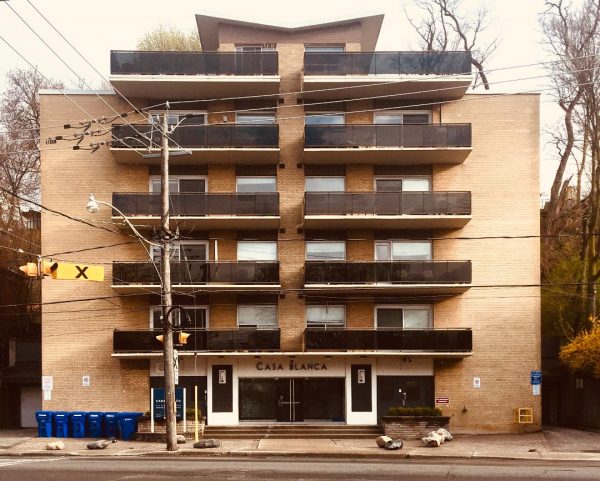
It took council and city planning officials almost exactly a year to adopt a policy meant to make Toronto’s abundant, overpriced and increasingly depopulated low-rise neighbourhoods safe for so-called missing middle housing types.
The narrative arc here extends from a motion last July by Mayor John Tory and housing czar Ana Bailão to a unanimous vote at last week’s council meeting. But the real story ripples much further back, first to a recent groundswell of advocacy and media attention on overly restrictive zoning regulations; then to anti-block-busting/”stable neighbourhoods” measures approved between the 1970s and the 1990s; next to the car-oriented suburban development orthodoxies of the 1950s and 1960s; and, if you really want to peel the onion, the anti-apartment building campaigns waged by wealthy homeowners and Toronto’s morality police going as far back as the 1910s.
In some ways, Toronto isn’t all that different from many North American cities when it comes to mixing low and moderate density housing (allowed before World War II; largely banned thereafter). And unsurprisingly, Toronto has arrived with customary hyper-caution at this particular moment in its planning history. Other cities — Minneapolis and Seattle, to name two — have been more daring in their moves to approve more gentle density as of right in residential/single-family neighbourhoods.
The particular changes approved could not be described as revolutionary. The city will allow “garden suite” dwellings (also known as granny flats or, in a quainter age, coach houses); more “dense low-rise housing options” on major streets (e.g., Mount Pleasant); and additional units within “permitted building envelopes” (more on this in a moment). The plan calls for lots of consulting (including with equity-seeking groups that haven’t been especially welcome in these conversations), reviewing, pilot projecting, and even “potential” official plan amendments.
The reference to “permitted building envelopes” is salient because the lion’s share of Toronto’s neighbourhoods are zoned “RD,” which stands for “residential detached.” This is the rock-ribbed post-war suburban zoning that excluded duplexes, triplexes, and walk-ups. In these areas, dubbed the yellow belt, only detached houses are allowed. What this new policy seems to propose is permitting additional units, presumably beyond a basement secondary suite, in structures that adhere to the allowable heights and densities set out in local zoning bylaws.
In other words, if you have a bungalow on a 120×30 sq.-ft suburban lot on a street lined by two or two-and-a-half storey houses, you could theoretically build a larger house-type dwelling, but one that has been divided into several apartments.
The wrinkle, however, is that the City’s official plan includes extremely stringent policies restricting any development that alters the “physical character” of residential neighbourhoods. These flow from a little understood and inadequately scrutinized land use planning policy known as Official Plan Amendment 320, which snuck through council in 2015 and survived a flurry of appeals before full adoption in 2018. The provisions have since been used by city planners, the committee of adjustment and residents organizations to block or attempt to block projects as modest as triplexes and townhouses.
The report approved last week at council doesn’t touch the “character” language in the official plan; the staff report only mentioned “potential” changes.
The upshot is that official ambiguity — or perhaps more appropriately, ambivalence — remains a feature of the city’s neighbourhood land use planning rules. That uncertainty also highlights the elephant-in-the-room problem that envelopes this whole discourse, which is the deeply entrenched culture of NIMBYism baked into our planning politics, Toronto’s residential real estate market and the governance structure of the city itself.
A relatively small number of self-appointed neighbourhood activists — mainly those leading the Federation of North Toronto Residents’ Associations — have had disproportionate influence on the trajectory of Toronto’s planning system, often at the expense of homeowners who aren’t “represented” by a busy-body neighbourhood association, residents who fervently believe in adding more housing types and affordable forms, and tenants themselves.
Over many years and decades, the City and City Council has paid way too much attention to organized and well-resourced residents associations and far too little attention to everyone else. Today, we have both the exclusionary planning rules and the real estate prices to show for it.
We also live with a strange paradox, which is that much of the missing-middle type housing that accumulated in (desirable) older neighbourhoods is either explicitly disallowed elsewhere within the city limits, economically unfeasible due to land prices and crushing municipal fees, or politically impossible to replicate because of opposition from frequently reactionary homeowner groups.
Case in point: the two-storey pre-fab supportive housing complex now going up on Dovercourt Road, south of College Street. This exceedingly modest project, with just 44 bachelor units, is located directly across the street from a police station. Yet local NIMBYs shouted so vociferously that the city ended up soliciting a ministerial zoning order from Queen’s Park to get the thing approved and built by the fall.
As Parkdale-High Park councilor Gord Perks likes to remind us, the missing middle measures alone won’t fix the multi-headed hydra that is Toronto’s housing crisis. For that, we need more public investment in affordable and supportive housing, more land moved out of the speculative market and into land trusts, renewed support for co-op housing, tighter restrictions on ghost hotels, conversions and renovictions, and more effective inclusionary zoning rules. The missing middle, like rental laneway housing, is less about affordability and more about widening the range of housing options.
Yet in my view, the missing middle is about something else, as well. It is about learning how to say yes again, or at least saying nothing at all if all you have to say is `keep out.’ It is about re-booting our knee-jerk political culture.
No one engaged in the debate about housing should forget that Toronto’s land use planning regulations contain strands of DNA that trace back to puritanical turn-of-the-last-century attitudes about single women, poor immigrants, and anyone who didn’t own a house. There is a lot of path dependency. What’s more, Toronto’s housing crisis exists as a direct consequence of the epic clash between the extraordinary dynamism of a rapidly-growing immigrant city and the extreme conservatism of our land use policies.
I can’t imagine that anyone who closely follows land use politics in Toronto could read council’s new direction and conclude that the city has taken a radical step. Toronto is doing what Toronto has done for years: inching forward, incrementally.
Whether the slightly altered planning framework approved last week will encourage more forbearance and less hysteria from residents groups and their parochial council allies remains to be seen.
This attempt at reform is a start. Hopefully, it won’t die the death of a thousand small complaints.





6 comments
Being one of those called a NIMBY over the last year, I would suggest there is a lot more that none of you are reporting on. In researching the ‘development’ slated to go up right next to me [ in spite of all the city plans since 1996 ] I came across some interesting facts that no one in the media seems to be interested in. So I am going to take it back to CITY COUNCIL soon. If you’d like to know more about what we discovered about REITs and CBRE, I am at danphilips@rogers.com
There needs to be a balance back to capitalism in this case. Zoning should be to built form as was done on King st. You can build up to 3 (5?) storeys in residential areas and zoning should allow for open options (bakery, grocery, florist, cafe, dentist, etc). Residential should also mean only that. Homes for people, independent of rental/detached etc. That would help create a more walkable, dense and affordable Toronto.
zoning is the ONE area where I will unabashedly support deregulation (not complete deregulation, of course, but to a substantial degree). The great cities of the world were built organically, through innumerable small-scale developments built independently and incrementally. Adopting such an approach for Toronto would lead to a built environment that, while perhaps hard to predict/plan for, would be much more fine-grained and vibrant.
Our current paradigm of off-limits residential neighbourhoods coupled with block-busting massive condo developments is sucking the life out of this city. Not just here either: in the US, hell even in Europe, the brand-new, master-planned areas of cities with block-sized buildings almost always lack the human feel of older, more established neighbourhoods. EVEN IF they’ve got great architecture or strong pedestrian/bike/transit friendliness.
I *pray* that Toronto returns to a more organic model of development sooner than later. The very heart and soul of our city hangs in the balance
This article singles out FoNTRA and make several claims such as that we have a “disproportionate influence”. It is disappointing to us. We have always read John Lorinc’s articles with great interest – they usually provide useful perspectives on urban planning and development topics.
However this time his comments are pejorative and a distortion of the facts, and he has refused to correct them when asked. We would have been pleased to talk with Mr. Lorinc about FoNTRA and how it operates before he wrote this article.
1. Mr. Lorinc claims that residents associations (and FoNTRA in particular) have a “disproportionate influence”. This seems highly doubtful – it has always seemed to us (and evident to most Torontonians) that it is land developers who hold that esteemed position!!.
2. In any case, surely residents associations are an important part of our democracy? In a democracy what do we want? Don’t we want people to get engaged as residents?? City Council decisions are the responsibility of City Council, not any one stakeholder group. If you do not like City Council decisions blame City Council!
3. FoNTRA like all resident associations is totally dependent on volunteers (no paid staff) for its work. Our 30ish member RAs pay only $50 per year. Hardly a well resourced organization!
4. We do not understand why Mr. Lorinc is trying to set up FoNTRA as the reason for failure of intensification and affordable housing. We are in support of yellowbelt initiatives (read our submission to Planning and Housing Committee). We believe it is important for the City to distribute growth across the City – not just already high density areas like Yonge and Eglinton!
4. We have participated in panel discussions on yellow belt matters with Mr. Lorinc and he surely must have recognised that we are rational, fact based and reasonable people. Again, read the FoNTRA submission to Planning and Housing Committee regarding the Neighbourhood Intensification item. You will find it to be an even handed positive response not at all like the pejorative tone that Mr. Lorinc attributes to residents associations.
Disappointing indeed!
I want to second Geoff Kettel and Cathie Macdonald’s remarks, and also to note that use of ‘NIMBY’, like use of other slur terms, operates as a deeply problematic blanket means of casting aspersions on a group of people without—as in this article—bothering to engage with their actual beliefs, actions, or intentions, not to mention the facts. (Case in point: the need for a ministerial order for the 150 Harrison development had nothing to do with local residents, but rather with the need to bypass the usual requirements for a zoning or COA amendment; and those local residents were uniformly in favour of affordable housing going on the site—namely, the affordable family housing that Habitat for Humanity was slated to build, and which would have housed at least 60 parents and children as opposed to 44 individuals.) The ‘NIMBY’ slur, in particular, is used to negatively characterize—and in the process silence and intimidate—anyone who dares become involved in planning their communities. Right-thinking people should not be using this term, or any other slur terms, for that matter.
Jessica —
No, it’s not a slur. NIMBY doesn’t mean to cast negativity on *anyone* “who dares become involved in planning their communities.” If you’ve ever read this site or the magazine, you’d know that community involvement is part of Spacing’s mantra.
What NIMBY signifies is a community involvement that goes far beyond their scope. It targets groups, like your OCA, that continue to oppose good development and keep a variety of housing out of your area in order to not have a neighbourhood change with the times.
NIMBY means groups that speak for 20-30 people in areas that have 10,000 or more. NIMBY means using your personal privilege — house ownership, academic sabbaticals, your skin colour, to name a few — to spend time trying to find the smallest of loopholes to oppose ANY development, especially when it comes to providing housing that is more affordable than your free-standing house.
You and the OCA — and certainly FoNTRA — shout loudest and want Toronto to be stuck in 1974 under Crombie (bless his heart, I love him and he was good for the era, but that was 45 years ago).
I’m sorry you’re offended, but there is a cure: stop being a road block that only goes to furthering your own personal wealth.